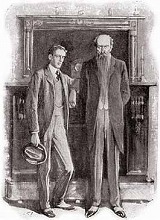I was, of course, familiar with the pictures of the famous statesman, but the man himself was very different from his representation. He was a tall and stately person, scrupulously dressed, with a drawn, thin face, and a nose which was grotesquely curved and long. His complexion was of a dead pallor, which was more startling by contrast with a long, dwindling beard of vivid red, which flowed down over his white waistcoat, with his watch-chain gleaming through its fringe. Such was the stately presence who looked stonily at us from the centre of Dr. Huxtable’s hearthrug. Beside him stood a very young man, whom I understood to be Wilder, the private secretary. He was small, nervous, alert, with intelligent light-blue eyes and mobile features. It was he who at once, in an incisive and positive tone, opened the conversation.

“I called this morning, Dr. Huxtable, too late to prevent you from starting for London. I learned that your object was to invite Mr. Sherlock Holmes to undertake the conduct of this case. His Grace is surprised, Dr. Huxtable, that you should have taken such a step without consulting him.”
“When I learned that the police had failed- -”
“His Grace is by no means convinced that the police have failed.”
“But surely, Mr. Wilder- -”
“You are well aware, Dr. Huxtable, that his Grace is particularly anxious to avoid all public scandal. He prefers to take as few people as possible into his confidence.”
“The matter can be easily remedied,” said the browbeaten doctor; “Mr. Sherlock Holmes can return to London by the morning train.”
“Hardly that, Doctor, hardly that,” said Holmes, in his blandest voice. “This northern air is invigorating and pleasant, so I propose to spend a few days upon your moors, and to occupy my mind as best I may. Whether I have the shelter of your roof or of the village inn is, of course, for you to decide.”
I could see that the unfortunate doctor was in the last stage of indecision, from which he was rescued by the deep, sonorous voice of the red-bearded Duke, which boomed out like a dinner-gong.
“I agree with Mr. Wilder, Dr. Huxtable, that you would have done wisely to consult me. But since Mr. Holmes has already been taken into your confidence, it would indeed be absurd that we should not avail ourselves of his services. Far from going to the inn, Mr. Holmes, I should be pleased if you would come and stay with me at Holdernesse Hall.”
“I thank your Grace. For the purposes of my investigation, I think that it would be wiser for me to remain at the scene of the mystery.”
“Just as you like, Mr. Holmes. Any information which Mr. Wilder or I can give you is, of course, at your disposal.”
“It will probably be necessary for me to see you at the Hall,” said Holmes. “I would only ask you now, sir, whether you have formed any explanation in your own mind as to the mysterious disappearance of your son?”
“No, sir, I have not.”
“Excuse me if I allude to that which is painful to you, but I have no alternative. Do you think that the Duchess had anything to do with the matter?”
The great minister showed perceptible hesitation.
“I do not think so,” he said, at last.
“The other most obvious explanation is that the child has been kidnapped for the purpose of levying ransom. You have not had any demand of the sort?”
“No, sir.”
“One more question, your Grace. I understand that you wrote to your son upon the day when this incident occurred.”
“No, I wrote upon the day before.”
“Exactly. But he received it on that day?”
“Yes.”
“Was there anything in your letter which might have unbalanced him or induced him to take such a step?”
“No, sir, certainly not.”